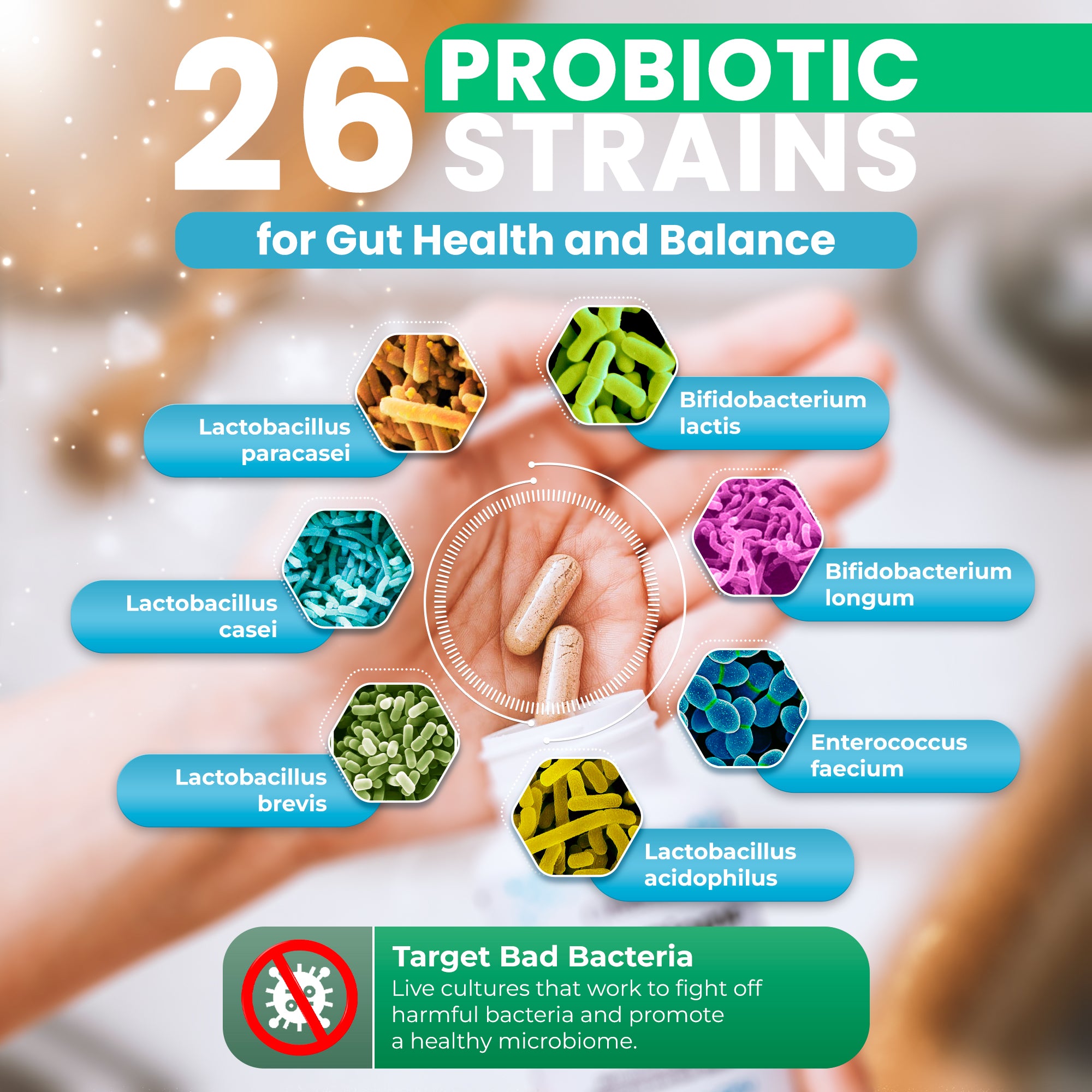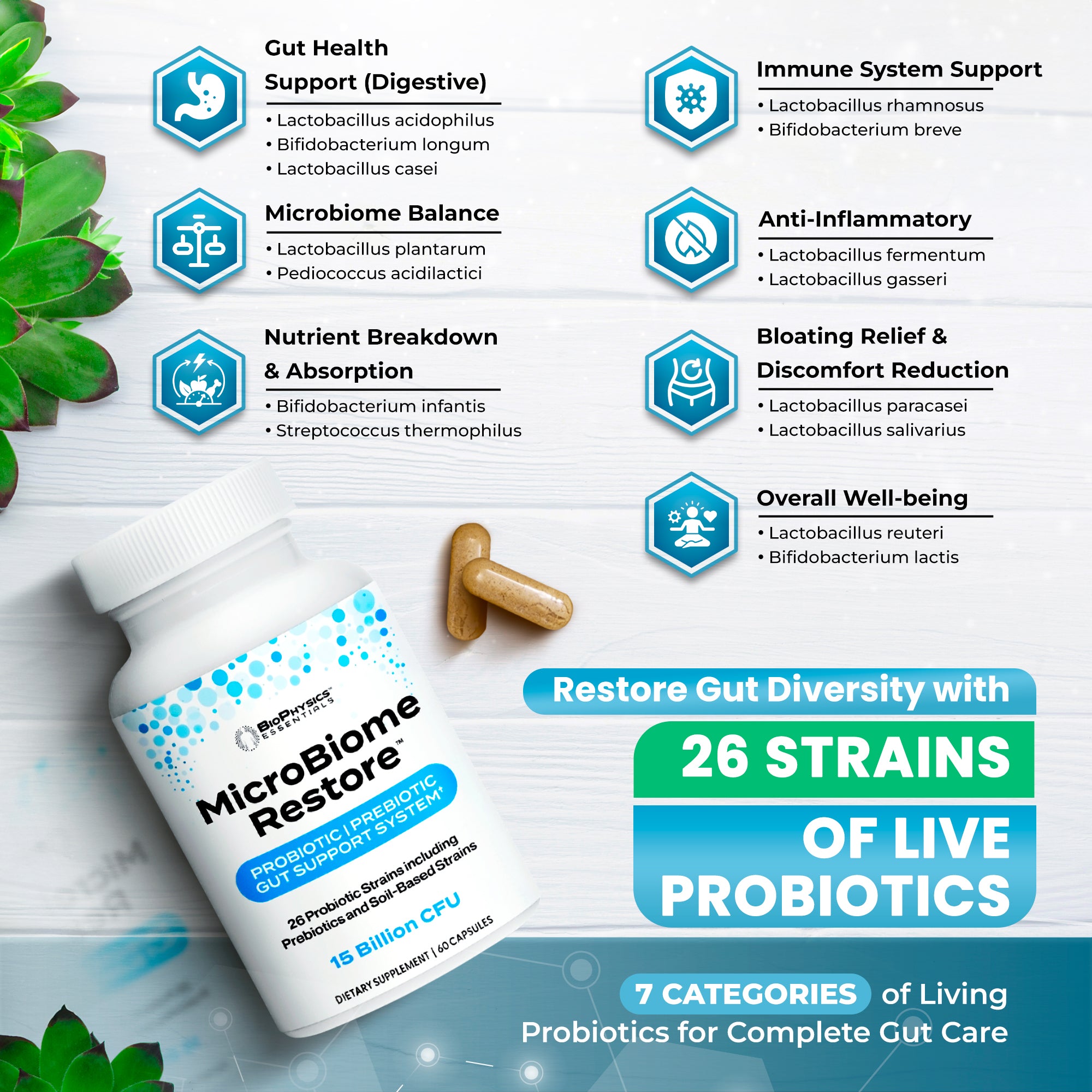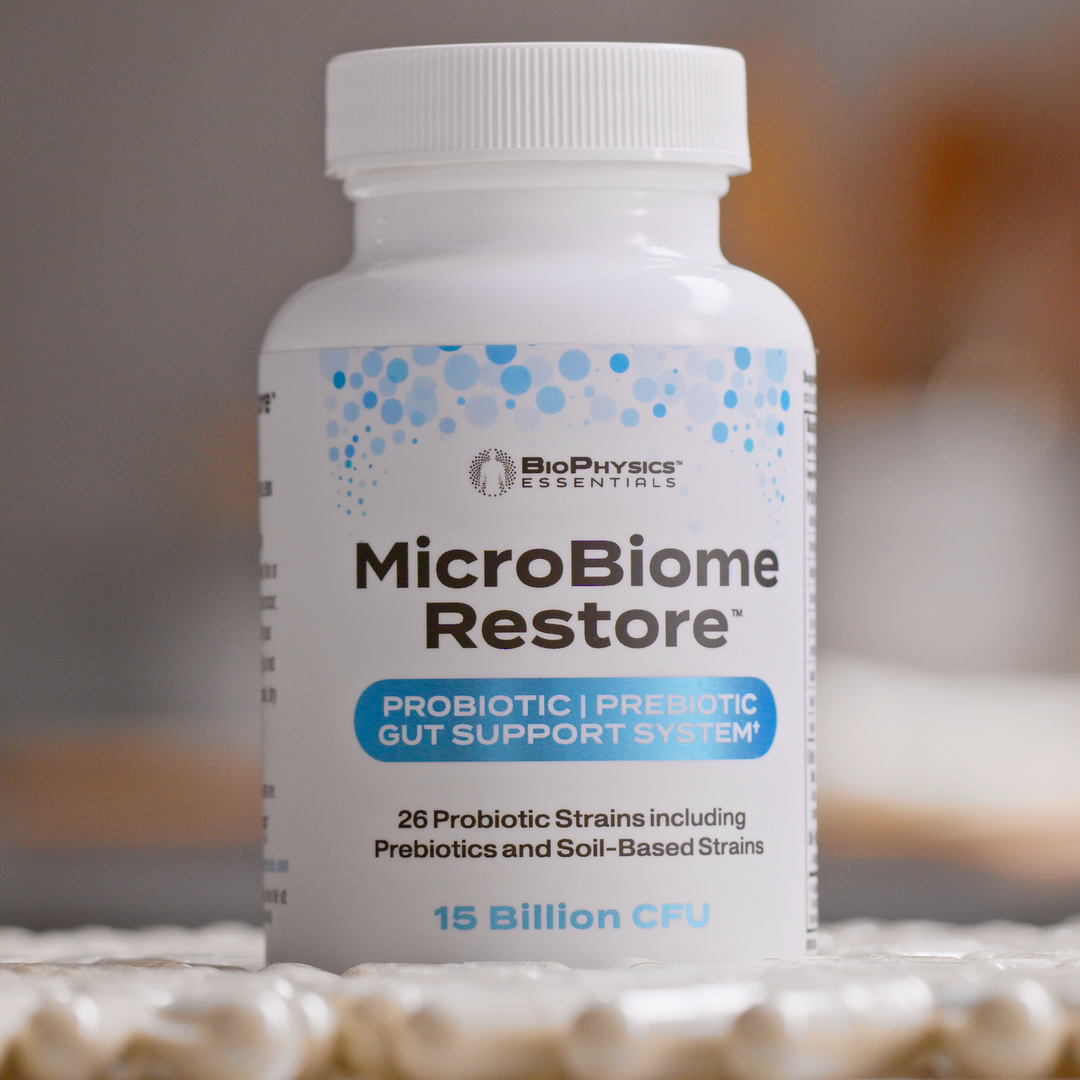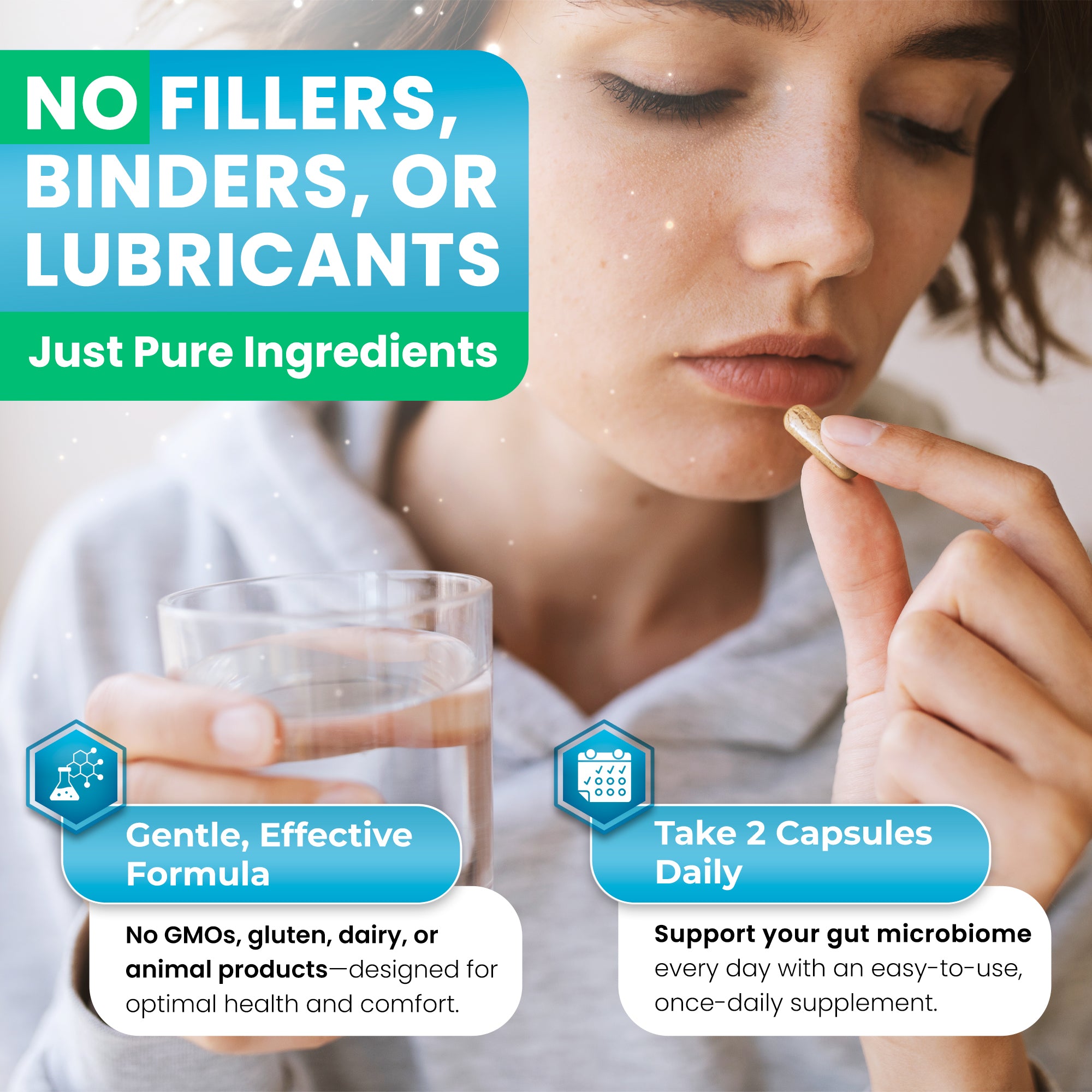Let's talk about one of the tiny helpers living in your belly - Bifidobacterium longum! This little guy is a superstar for keeping your tummy happy and healthy. We'll explore where you can find B. longum in food and why it's so important for your body. We'll look at the science behind this helpful bacterium, discuss its health benefits, and give you tips on adding it to your daily diet for a healthy gut.
Key Takeaways
- Bifidobacterium longum is a beneficial probiotic that supports digestive and overall health
- It can be found in fermented foods like yogurt, kefir, and some cheeses
- Prebiotic foods like bananas, onions, and garlic help B. longum thrive in your gut
- Supplements containing B. longum can provide additional support for gut health
- A balanced diet rich in probiotics and prebiotics can help maintain a healthy gut microbiome
- Consult with a healthcare professional before making significant changes to your diet or starting supplements
What is Bifidobacterium longum?
Bifidobacterium longum is a type of good bacteria that lives in your gut. It's like a friendly neighbor who helps keep your digestive system running smoothly. These bacteria are some of the first to move into your gut when you're born, especially if you're breastfed. In fact, B. longum is one of the most abundant species found in the intestines of breastfed babies, playing a crucial role in developing a healthy immune system from the earliest stages of life.
B. longum is part of a big family of bacteria called probiotics. These are the good guys that help keep your body healthy. Learning about different probiotics like B. lactis can help you understand how they work together in your gut. As you explore the world of probiotics, you'll discover that each strain has unique properties and benefits, contributing to the complex ecosystem within your digestive system.
Why is B. longum Good for You?
B. longum is like a tiny superhero in your gut. Here are some of its superpowers:
Key Benefits of Bifidobacterium longum
- Improves digestion by breaking down complex carbohydrates
- Fights harmful bacteria by producing antimicrobial compounds
- Boosts immune function through interaction with gut-associated lymphoid tissue
- May improve mood by influencing the gut-brain axis
- Helps break down fiber, producing beneficial short-chain fatty acids
- B. longum's acetate production is essential for cross-feeding interactions that enable butyrate synthesis—our guide on how to increase SCFAs and butyrate explains why this matters for gut health.
- Produces essential vitamins, particularly B vitamins and vitamin K
- Supports overall gut health by maintaining intestinal barrier integrity
These bacteria work hard to break down the food you eat, especially tough stuff like fiber. They also make vitamins that your body needs and help your immune system stay strong. Some studies even show that having enough B. longum might help you feel less stressed or sad! This is due to the gut-brain connection, where the health of your digestive system can influence your mental well-being. B. longum has been shown to produce neurotransmitters and other compounds that can affect mood and cognitive function.
While B. longum supports stress resilience through the gut-brain axis, Lactobacillus rhamnosus JB-1 has been shown to directly modulate GABA receptors in the brain via the vagus nerve.
B. longum's clinically demonstrated benefits for stress reduction and sleep quality make it a key strain for men over 40 navigating peak career and life pressures.
Beyond its well-known digestive benefits, B. longum has emerged as a key strain for men's health—research shows it can reduce oxidative stress and inflammation in prostate tissue by approximately 6-fold, which we cover in depth in our article on the best probiotics for prostate health.
Where Can You Find B. longum in Food?
Now for the fun part - let's talk about foods that have B. longum or help it grow in your gut! Understanding the sources of this beneficial bacterium can help you make informed choices about your diet and support your gut health naturally.
Fermented Foods
Fermented foods are like a party for good bacteria. They include:
- Yogurt (look for ones that say "live cultures") - particularly those made with bifidobacteria
- Kefir (a tangy drink that's like drinkable yogurt) - often contains multiple probiotic strains
- Sauerkraut (fermented cabbage that's great on sandwiches) - rich in lactic acid bacteria
- Kimchi (spicy Korean fermented veggies) - a diverse source of probiotics
- Some aged cheeses - particularly those made with raw milk
- Kombucha - a fermented tea beverage that can contain various probiotic strains
These foods are not only tasty but also packed with probiotics like B. longum. Exploring natural sources of probiotics can help you add more variety to your diet. It's important to note that the probiotic content can vary depending on the manufacturing process and storage conditions, so look for products that specifically mention live cultures or probiotics on the label.
Prebiotic Foods
Some foods don't have B. longum but help it grow in your gut. These are called prebiotics. They're like food for your good bacteria. Some prebiotic foods are:
- Bananas - especially slightly underripe ones
- Onions - raw or cooked
- Garlic - contains inulin, a powerful prebiotic
- Asparagus - high in inulin and fructooligosaccharides
- Whole grains - such as oats, barley, and wheat
- Jerusalem artichokes - an excellent source of inulin
- Chicory root - often used as a coffee substitute and rich in prebiotics
- Leeks - contain significant amounts of inulin
Eating these foods can help the B. longum in your gut thrive and multiply! Prebiotics work by providing the necessary nutrients for probiotics to flourish in your digestive system. By combining probiotic and prebiotic foods in your diet, you create a synbiotic effect that maximizes the benefits for your gut health.
Supplements: Another Way to Get B. longum
Sometimes, it's hard to get enough B. longum just from food. That's where supplements come in. They're like a shortcut to boost your gut health. Probiotic supplements can be particularly beneficial for those who have difficulty consuming fermented foods regularly or have specific health conditions that may benefit from targeted probiotic supplementation.
One example is MicroBiome Restore. This supplement has 26 different types of good bacteria, including B. longum. It's like a superhero team for your gut! Knowing when to take probiotics can help you get the most benefit from them. For instance, some studies suggest that taking probiotics on an empty stomach or just before a meal may enhance their survival through the digestive tract.
Antibiotics significantly deplete B. longum populations, with incomplete recovery even 4 weeks post-therapy—our antibiotic recovery guide explains how to restore these critical bacteria.
Tips for Adding B. longum to Your Diet
Ready to give your gut a boost? Here are some easy ways to add more B. longum to your life:
- Start your day with yogurt or kefir - try adding fresh fruits or a drizzle of honey for extra flavor
- Add sauerkraut or kimchi to your sandwiches or salads - these fermented veggies pack a probiotic punch
- Snack on bananas or whole grain crackers - pair them with nut butter for a satisfying and gut-friendly treat
- Try making your own fermented foods at home - it's easier than you might think and allows you to control the ingredients
- Consider a supplement like MicroBiome Restore - especially if you're having trouble getting enough probiotics from food alone
- Incorporate prebiotic-rich foods into your meals - try roasting garlic and onions as a side dish or adding asparagus to your stir-fries
- Experiment with kombucha - look for varieties that are low in added sugars
- Try a probiotic smoothie - blend kefir or yogurt with prebiotic-rich fruits for a double benefit
Remember, everyone's gut is different. What works for one person might not work for another. It's always a good idea to talk to a doctor or nutritionist before making big changes to your diet. They can help you determine the best approach based on your individual health needs and any existing conditions you may have.
Wrapping It Up: Your Gut's New Best Friend
Bifidobacterium longum might be tiny, but it plays a big role in keeping you healthy. From helping you digest food to boosting your mood, these little bacteria are true allies in your wellness journey. By adding probiotic-rich foods to your diet or trying a supplement, you can give your gut the support it needs. The benefits of a healthy gut microbiome extend far beyond digestion, influencing everything from your immune system to your mental health.
It's worth noting that B. longum subspecies infantis—commonly called Bifidobacterium infantis—has distinct clinical applications for IBS that differ from other B. longum subspecies.
Remember, a happy gut often means a happier you! So why not start exploring the world of B. longum today? Your tummy will thank you! As you incorporate more probiotic and prebiotic foods into your diet, pay attention to how your body responds. You may notice improvements in digestion, energy levels, and overall well-being.
Want to learn more about gut health and probiotics? Check out our other articles on the benefits of Lactobacillus acidophilus and our collection of probiotic products. Your journey to better gut health starts here! By continuing to educate yourself about the complex world of gut bacteria, you'll be better equipped to make informed decisions about your health and well-being.
References
- O'Callaghan A, van Sinderen D. Bifidobacteria and Their Role as Members of the Human Gut Microbiota. Front Microbiol. 2016 Jun 15;7:925.
- Tojo R, et al. Intestinal microbiota in health and disease: role of bifidobacteria in gut homeostasis. World J Gastroenterol. 2014 Nov 7;20(41):15163-76.
- Riedel CU, et al. Anti-inflammatory effects of bifidobacteria by inhibition of LPS-induced NF-kappaB activation. World J Gastroenterol. 2006 Jun 14;12(22):3729-35.
- Khalesi S, et al. A review of probiotic supplementation in healthy adults: helpful or hype? Eur J Clin Nutr. 2019 Jan;73(1):24-37.
- Sekirov I, et al. Gut microbiota in health and disease. Physiol Rev. 2010 Jul;90(3):859-904.
- Parvez S, et al. Probiotics and their fermented food products are beneficial for health. J Appl Microbiol. 2006 Jun;100(6):1171-85.
- Maynard CL, et al. Reciprocal interactions of the intestinal microbiota and immune system. Nature. 2012 Sep 13;489(7415):231-41.
- Turroni F, et al. Diversity of bifidobacteria within the infant gut microbiota. PLoS One. 2012;7(5):e36957.
- Roberfroid MB. Inulin-type fructans: functional food ingredients. J Nutr. 2007 Nov;137(11 Suppl):2493S-2502S.
- Hill C, et al. Expert consensus document: The International Scientific Association for Probiotics and Prebiotics consensus statement on the scope and appropriate use of the term probiotic. Nat Rev Gastroenterol Hepatol. 2014 Aug;11(8):506-14.
- Gibson GR, et al. Expert consensus document: The International Scientific Association for Probiotics and Prebiotics (ISAPP) consensus statement on the definition and scope of prebiotics. Nat Rev Gastroenterol Hepatol. 2017 Aug;14(8):491-502.
- Stenman LK, et al. Potential probiotic Bifidobacterium animalis ssp. lactis 420 prevents weight gain and glucose intolerance in diet-induced obese mice. Benef Microbes. 2014 Dec;5(4):437-45.
- Doron S, Snydman DR. Risk and safety of probiotics. Clin Infect Dis. 2015 May 15;60 Suppl 2:S129-34.









Share and get 15% off!
Simply share this product on one of the following social networks and you will unlock 15% off!